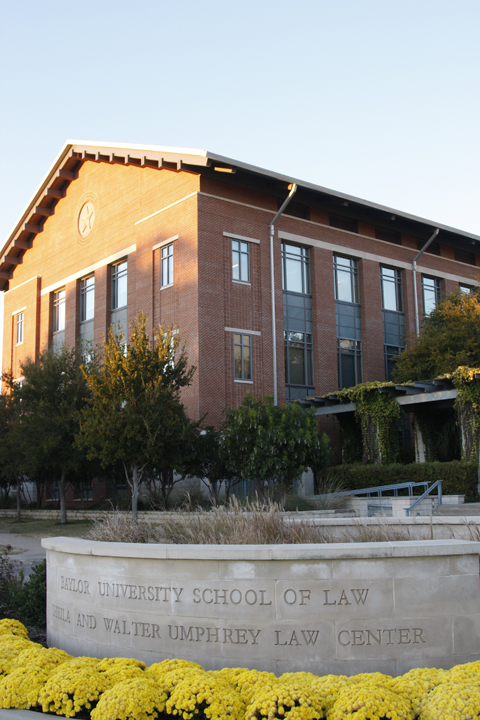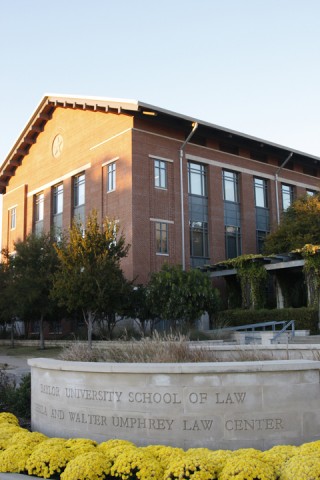

Makenzie Mason | Round Up Photo Editor
By Mallory Hisler
Reporter
It was literally a win-win situation for Baylor Law School when adjunct professor Robert Little took his two mock trial teams to the National Trial Competition in Austin last weekend.
The two Baylor teams eliminated every other school in the competition until it was Baylor student versus fellow Baylor student, and for one couple, husband versus wife, vying for the national win.
Mark Walraven, who was named Best Advocate and was a member of the winning team along with Steven Lopez, took on a fierce competitor in the final round.
“My wife Chaille was on the other team,” Mark Walraven said. “Going against her in the final round, the judges were trying to see if I was going to get myself in trouble.”
Although most couples do not compete to see who is the better at arguing, Mark Walraven said he enjoyed having his wife on an opposing team because she made him better.
“We practice at home — we’re nerds,” he said. “She pushes me to be better. She’s my hardest witness to cross-examine. She’s my best supporter and hardest critic. It made the last round fun and seem easier.”
Joel Towner, one of the four students at the competition, made up the second half of Chaille Grant Walraven’s team, which took second place.
The National Trial Competition is the largest and oldest mock trial competition, according to the Baylor Law School.
Twenty-eight regional winners advanced to the national finals and were primarily judged by Fellows of the American College of Trial Lawyers.
Both Baylor teams advanced to nationals by taking first and second at the regional competition in February.
Lopez had great things to say about the leadership of team’s coach, Robert Little, who is an attorney at the Waco law firm Naman, Howell, Smith & Lee, PLLC.
“He’s amazing — just brilliant,” Lopez said. “He doesn’t let us be actors. He makes us be lawyers.”
Lopez said the win took a weight off the shoulders of the members of both teams.
“The amazing part is to not have to practice,” Lopez said. “We are all four weeks from graduation, so it feels great.”
Lopez said when including time spent preparing on their own, practicing for the competition could at times equate to the hours of a full-time job.
Mark Walraven agreed and said the team began preparing at the end of last year.
“The team started in December preparing, and we’ve practiced five to six days a week ever since the start of January. Each practice runs around three hours,” Mark Walraven said. “The practices themselves are when we get together, but when we’re on our own, we have to do our research.”
Little said the team wowed trial judges and lawyers at the competition.
Little has also competed in mock trial competitions as a student at Baylor Law School and won a national championship in 2005.
“We focus on not trying to make this like a play, not like a theater production, but a trial,” Little said. “I think that we were very successful this year.”
He believes the reason Baylor’s teams rose to the top is because of the unique preparation Baylor Law School students undergo.
“They’ve gone through practice court, advocacy training and a lot of things to get them ready,” Little said. “So we [Baylor Law School] do a good job getting them ready for the courtroom.”
Little said the difference Baylor Law School makes and how it affects the students is evident in competitions like this.
“One of the things that we pride ourselves on at Baylor is preparing students to be lawyers the moment they graduate. It’s pretty well known Baylor is a place to go if you want to win cases,” Little said. “They were done being law students [at the competition]. They were lawyers.”
In the four years Little has been coaching, this is the second time a Baylor team has won nationals. The first time Baylor won this competition was in 2009.
“He is very, very good at getting the best out of his students,” Mark Walraven said.
Mark Walraven and Lopez were both excited about winning, but were also eager for the things it could do for Baylor, such as attracting more students.
“It’s really less about the four of us and more about what Baylor Law School does,” Walraven said. “We’re the only school that has a program like the practice court program, where it’s required to take a case over a six-month period and really learn how to do a case.”
Lopez said competing against the other Baylor team didn’t make him feel uneasy, but rather the opposite.
“We were more relaxed at that point because the school had already won a national championship,” he said. “It brought out the best in us; we could relax and be lawyers.”





